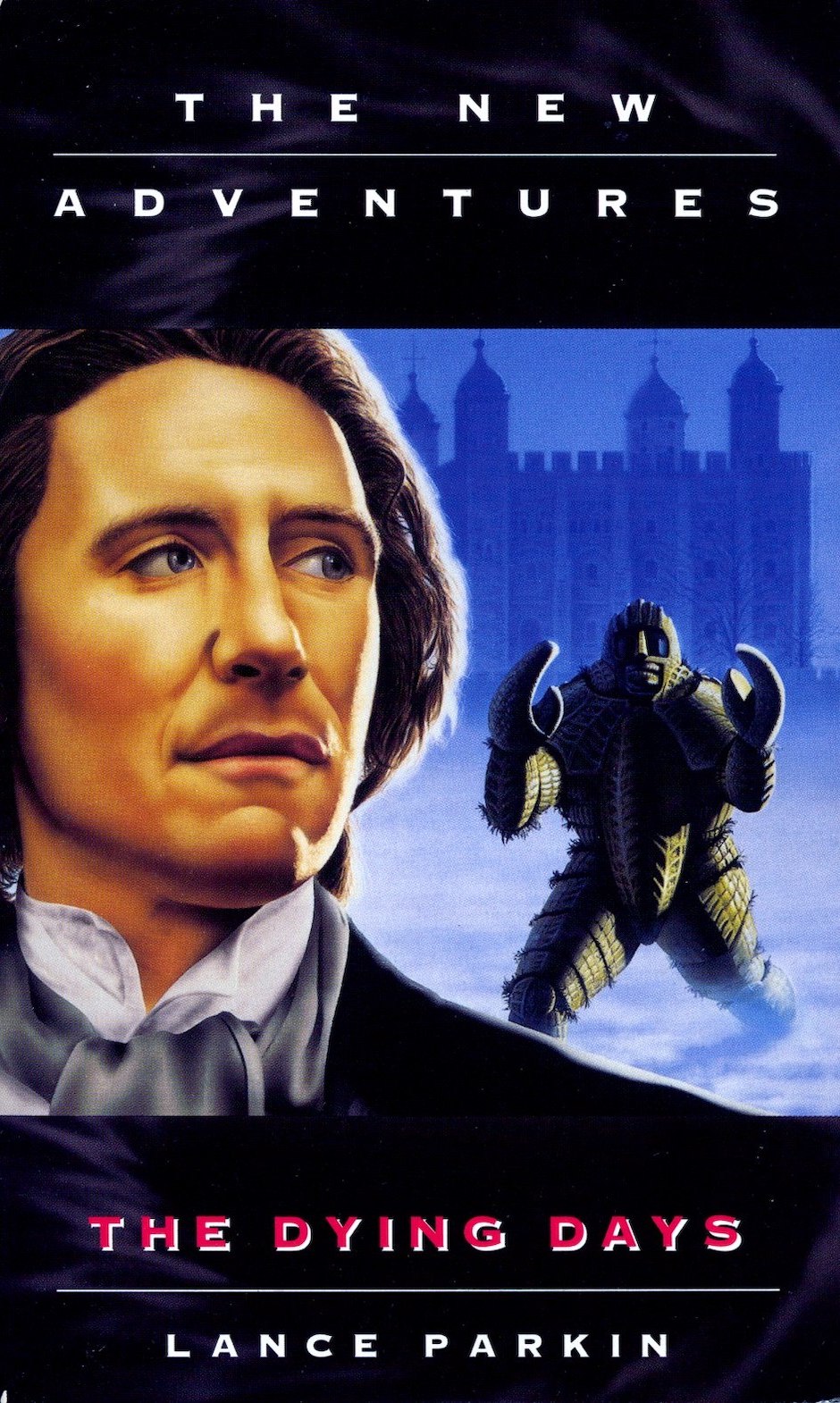 Story: Near the end of the 20th century, Bernice visits the Doctor’s house on Allen Road, a residence he maintains in seclusion on Earth, where they have arranged to meet. But things have changed for the Doctor in the intervening months/years – he has regenerated. After convincing Benny that he is the same Time Lord she once knew, sinister events literally land on top of them as a man – whom the government has declared to be a dangerously unstable fugitive – escapes on the eve of a British manned landing on Mars. (Presumably this story takes place in the same alternate history in which Britain landed on Mars in 1970 in the Pertwee story The Ambassadors Of Death.) But the mission goes very wrong – the astronauts stumble into the burial crypts of the Martian natives, whom the Doctor knows as the Ice Warriors. Immediately an Ice Warrior invasion seizes Britain, deposing the monarchy and establishing a Martian foothold on Earth. The Doctor, with his centuries of experience with both the Ice Warriors and despotic would-be rulers such as the man who claims a place as the Martian liaison to the British people, tries to intervene, finding help in unlikely places. The aging Brigadier Lethbridge-Stewart and his young successor Bambera (a fondly remembered character from the 1989 Battlefield episode) have gone underground, preparing to wage a guerilla war on the Ice Warriors (and the greedy humans who are trying to achieve their own status by becoming the aliens’ collaborators), and Benny, who has a great deal of experience with the Ice Warriors herself.
Story: Near the end of the 20th century, Bernice visits the Doctor’s house on Allen Road, a residence he maintains in seclusion on Earth, where they have arranged to meet. But things have changed for the Doctor in the intervening months/years – he has regenerated. After convincing Benny that he is the same Time Lord she once knew, sinister events literally land on top of them as a man – whom the government has declared to be a dangerously unstable fugitive – escapes on the eve of a British manned landing on Mars. (Presumably this story takes place in the same alternate history in which Britain landed on Mars in 1970 in the Pertwee story The Ambassadors Of Death.) But the mission goes very wrong – the astronauts stumble into the burial crypts of the Martian natives, whom the Doctor knows as the Ice Warriors. Immediately an Ice Warrior invasion seizes Britain, deposing the monarchy and establishing a Martian foothold on Earth. The Doctor, with his centuries of experience with both the Ice Warriors and despotic would-be rulers such as the man who claims a place as the Martian liaison to the British people, tries to intervene, finding help in unlikely places. The aging Brigadier Lethbridge-Stewart and his young successor Bambera (a fondly remembered character from the 1989 Battlefield episode) have gone underground, preparing to wage a guerilla war on the Ice Warriors (and the greedy humans who are trying to achieve their own status by becoming the aliens’ collaborators), and Benny, who has a great deal of experience with the Ice Warriors herself.
Review: This is the first and only eighth Doctor novel published by Virgin Books prior to surrendering the Doctor Who license to BBC Books in the summer of 1997. One thing to consider when judging any eighth Doctor book is that there were a mere 90 minutes of Paul McGann’s performance as the revitalized Time Lord from which to extrapolate the entirety of the character. It’s been interesting to see how different authors (and their editors) have interpreted that performance and that character. For the most part, “The Dying Days” does it rather well.
One of my favorite New Adventures, “The Dying Days” bids farewell to the Doctor Who franchise (officially, anyway) in class, with a very familiar and welcoming blend of high drama and eccentric, distinctively British humor. It also turns the tables on several Who conventions – in this case, the Brigadier remembers the Doctor immediately because they’ve already met…in the eighth Doctor’s future. (Usually it’s the other way around.) Benny’s uncertainty about just who the new Doctor is is portrayed very well throughout the book, and is one of its more intriguing features, culminating in a slightly controversial scene – at least in fan discussions – where Benny realizes that the new Doctor’s timeless ideals of peace and justice, combined with his dashing young appearance, hold a certain amount of sex appeal for her, whereas the seventh Doctor was an older, more fatherly figure to her. I could tell you how Benny acts on this realization, but that would be telling. In another very effective scene, there is a brief mention of Benny feeling a chill as she sees the seventh Doctor’s trademark umbrella gathering dust in the TARDIS. While “The Dying Days” expands very well on Paul McGann’s very brief stint as the Doctor, it also reminds us of how much we miss Sylvester McCoy’s portrayal as well. It’s also effective as a light dramatic romp, very much like the 1996 movie, a much-needed break from the doom-laden gothic atmosphere of “Lungbarrow”.
Additionally, in one scene, the Doctor risks his new incarnation to save not the world, not a city, not one person, but a stray cat, from falling victim to the Red Death (the Ice Warriors’ intelligent airborne virus), almost getting himself killed by it in the process. As a friend of kitties everywhere, I have to applaud this scene, but it’s also a perfect and simple example of the quality that the eighth Doctor seemed to exemplify best in his time on the screen – a deep respect and care for all things living, but with a more innocent and less devious aspect. In that regard, Lance Parkin captured the eighth Doctor perfectly and set a standard for future novels featuring the character to follow.
Year: 1997
Author: Lance Parkin
Publisher: Virgin
Pages: 256

